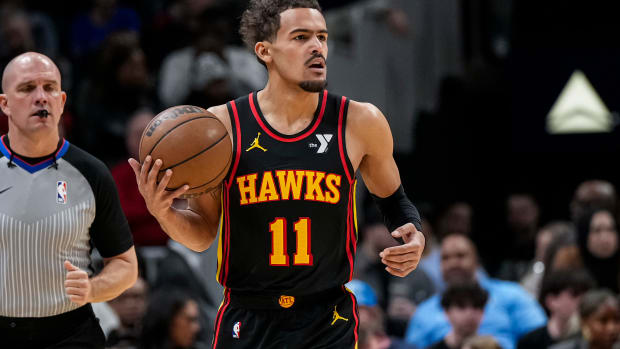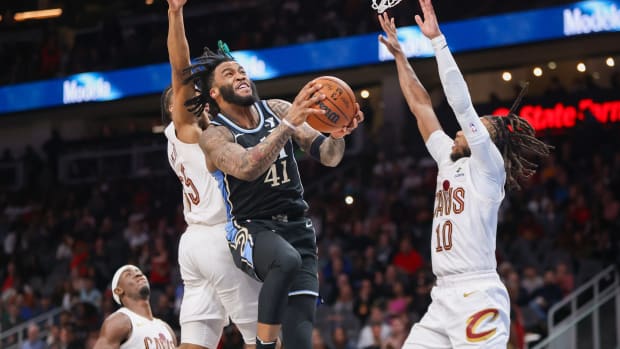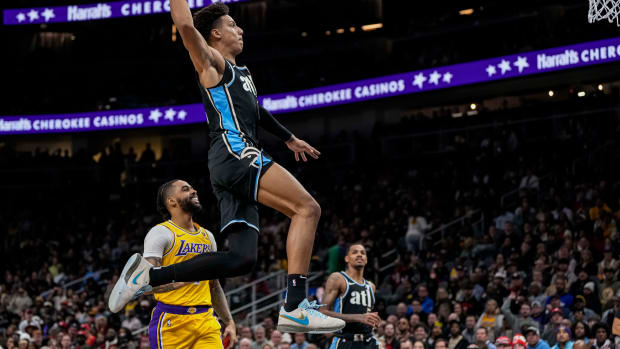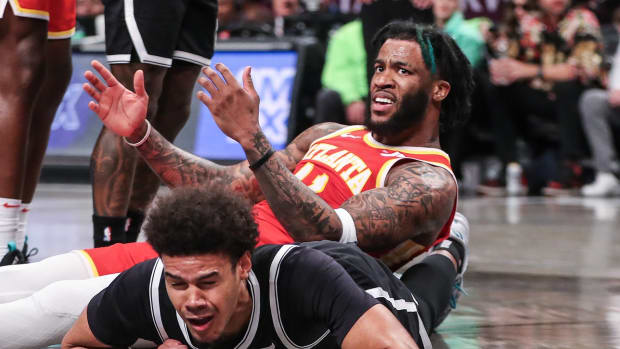'Our Guys Played With a Good Spirit': Hawks Finally Separate, Snap Losing Streak
After the Hawks’ loss to the Timberwolves a week ago, Lloyd Pierce lamented his team’s lack of discipline and inability to extend and maintain leads through the final buzzer. The Hawks had let a 10-point lead fade into a 12-point loss that night, and an opportunity to snap what was a seven-game losing streak was squandered. “We don’t know how to separate,” Pierce said after the game. That statement held true two nights later, when a five-point third-quarter margin flipped into a nine-point Bucks win, and again Friday night, when an 18-point lead melted away for an overtime loss in Indiana.
Monday night, Atlanta finally separated. The Hawks outscored the Warriors 29-17 in the second quarter, but rather than allowing their lead to dissipate, they extended it throughout the third quarter until they had earned a 104-79 win. Atlanta didn’t play particularly well Monday night, but when its opponent shoots a 41.6 effective field goal percentage and turns the ball over on 27 percent of its possessions, a team doesn’t need to. The Hawks scored a pedestrian 110.6 points per 100 possessions, according to Cleaning the Glass’s data, and shot just 28.6 percent from 3-point range. The Warriors grabbed 18 offensive rebounds, but Atlanta seemed to keep coming up with timely boards that helped spur its offense.
Coaches and players often preach the importance of turning defense into offense, and Monday night was evidence of that aphorism in action. Atlanta fueled its transition attack by recovering loose balls and holding the Warriors’ offense under wraps, which prevented Golden State from setting its defense and locating cutters or trailers. Over 22 percent of the Hawks’ offense came in transition and they scored nearly 1.4 points per possession in those situations.
“We try and tell our guys, a lot of times the defense will settle our offense,” Pierce said. “We play with that type of spirit – we’re active and we’re not afraid to make mistakes and opportunities for ourselves in transition because of our defense – it will help our offense out a lot. And I thought tonight that was big. We didn’t have a clean game, we didn’t shoot extremely well, and we created these opportunities and that’s because of our defense.”
The Hawks sealed the game for good midway through the third quarter, using a 14-2 run to extend their lead to 23 – largely without Trae Young or De’Andre Hunter on the floor. The unit of Tyrone Wallace, DeAndre’ Bembry, Evan Turner, Vince Carter, and Alex Len held Golden State scoreless over the final four minutes and 21 seconds of the period, by which point the Warriors had nothing left in the tank. “I just thought our guys played with a good spirit,” Pierce said. “We were trying to get to fifty-fifty balls, getting out in transition after we were getting stops, we were switching on and off the ball, and just kind of making it difficult.”
“We just wanted to kind of get out defensively and just stay active,” Carter said. “They move the ball, a lot of body movement, so for us it’s our communication. I think we got a lot of deflections and got out in transition, and the ball moved when we felt there were two on the ball.”
The second unit’s play was a boon for Atlanta, who has lately relied on heroic efforts from Young just to stay in games. In this game, however, he finished with a pedestrian 24 points and seven assists (and seven turnovers) while others filled in around him. The Warriors started the game by trapping Young hard in the pick-and-roll and forcing his teammates to beat them. The other Hawks happily obliged. Hunter tallied 18 points (on his 22 birthday, no less) and Damian Jones chipped in a career-high 16 points and eight rebounds. Len played his third strong game in a row while Turner’s eight points and five assists off the bench were critical in steadying the offense when Young sat.
Most importantly, Atlanta seemed to play with a sense of urgency it had lacked at moments during its 10-game losing streak. Rather than stumbling out of the gate, collapsing down the stretch, or letting up when their lead grew comfortable, the Hawks maintained their effort and focus for the duration of the game. When they sensed a chance to put the Warriors away, they seized it. “We played hard tonight,” Young said. “We played with a lot of energy, fed off each other’s energy, and I think that’s a big reason why we won. So if we continue to do that we’ll be alright.”
Sustaining that sort of discipline and energy can be difficult for young teams. Encouraging though it was for the Hawks to finally win a game, it came against perhaps the worst team in the NBA. The Warriors had neither the talent nor the discipline to counter Atlanta’s runs, and once things began to spiral, there was little hope for a comeback. Most opponents will prove less flimsy and more persistent. But while Monday may not represent some grand inflection point in Atlanta’s season, it can, at the very least, offer some reprieve from the dreariness of defeat and hope for a change in the team’s trajectory. “I don’t know if it’s a momentum-builder,” Pierce said. “but it’s good to get off the other side of the momentum.”





